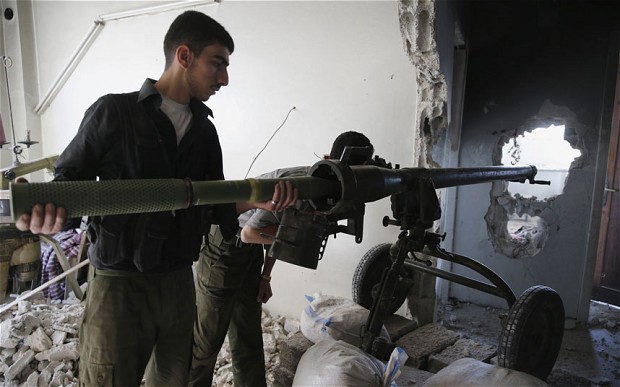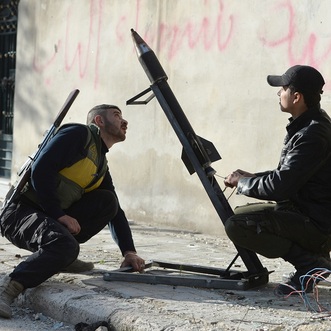www.aljazeerah.info
News, July 2013
Archives
Mission & Name
Conflict Terminology
Editorials
Gaza Holocaust
Gulf War
Isdood
Islam
News
News Photos
Opinion Editorials
US Foreign Policy (Dr. El-Najjar's Articles)
www.aljazeerah.info
|
Editorial Note: The following news reports are summaries from original sources. They may also include corrections of Arabic names and political terminology. Comments are in parentheses. |
Syrian Army Battles Opposition Fighters Over Khan Al-Assal, the Focus of Chemical Weapons Row
July 31, 2013
 |
 |
| Syrian Opposition Fighters |
Fighting Rages for Town in Syria Chemical Weapons Row
Naharnet, AFP, July 31, 2013
Syrian troops attacked rebel positions outside Khan al-Assal on Wednesday as they seek to recapture the northern town at the center of rival chemical weapons accusations, a watchdog said.
Fierce fighting erupted on the outskirts of the town, which the rebels seized on Monday of last week inflicting heavy losses on the army, the Syrian Observatory for Human Rights said.
The army lost 150 soldiers over two days, 50 of them summarily executed after their capture in an act condemned by the mainstream opposition leadership.
The government has been keen to recapture the town, the last to fall out of its control in the western half of Aleppo province.
The town was the scene of what both the government and the opposition say was a chemical weapons attack that killed 30 people on March 19.
The Syrian government says the rebels carried it out, and its ally Moscow says it has concrete proof.
The opposition says President Bashar Assad's regime was behind it and Washington has said it has seen no firm evidence of rebel responsibility.
The Damascus government has pressed for Khan al-Assal to be the primary focus of a planned U.N. inquiry into a total of 13 allegations of chemical weapons use during the 28-month conflict.
The rebels' capture of the town last week came as two U.N. envoys visited Damascus to thrash out the ground rules for U.N. weapons inspectors. They came away with an agreement but U.N. chief Ban Ki-moon has said he is still reviewing the details.
Syria army and rebels in battle for town at centre of chemical weapons claims
Telegraph, July 31, 2013, AFP
Fierce fighting erupted on the outskirts of the town on Wednesday, which the rebels seized on Monday of last week inflicting heavy losses on the army, the Syrian Observatory for Human Rights said.
The army lost 150 soldiers over two days, 50 of them summarily executed after their capture in an act condemned by the mainstream opposition leadership.
The government has been keen to recapture the town, the last to fall out of its control in the western half of Aleppo province.
The town was the scene of what both the government and the opposition say was a chemical weapons attack that killed 30 people on March 19.
The Syrian government says the rebels carried it out, and its ally Moscow says it has concrete proof.
The opposition says President Bashar al-Assad's regime was behind it and Washington has said it has seen no firm evidence of rebel responsibility.
The Damascus government has pressed for Khan al-Assal to be the primary focus of a planned UN inquiry into a total of 13 allegations of chemical weapons use during the 28-month conflict.
The rebels' capture of the town last week came as two UN envoys visited Damascus to thrash out the ground rules for UN weapons inspectors. They came away with an agreement but UN chief Ban Ki-moon has said he is still reviewing the details.
The army also bombarded several rebel-held neighbourhoods of Aleppo city before dawn on Wednesday, the Observatory said. Several children were wounded when a shell hit a field hospital in the Maysara neighbourhood.
Pro-government newspaper Al-Watan quoted a senior official it did not identify as saying that troop reinforcements would arrive in Aleppo soon to boost the army's hand against the rebels.
"Aleppo is still the number one priority for Syrian leaders," the paper cited the official as saying.
"The resistance being put up by the city will disappoint those who are counting on it falling into the clutches of international terrorism."
The Syrian government consistently refers to all rebel forces as "terrorists" and makes no distinction between jihadists groups blacklisted by Washington and mainstream groups that have Western and Arab backing.
"The strategic successes of the army in Homs and in the eastern suburbs (of the capital) mean it is more determined than ever to carry out its duties in Aleppo," Al-Watan said.
On Monday, the army recaptured the Khaldiyeh neighbourhood of Homs in its biggest gain so far in a month-old offensive against the remaining rebel-held districts of the strategic central city.
The city's oil refinery came under fire on Wednesday for the second time in a week, the Observatory said.
Several of the refinery's staff were wounded by "terrorist rocket fire," the state SANA news agency.
As UN efforts to convene a Russian- and US-backed peace conference have faltered, government forces have launched counteroffensives in the centre and north, as well as around the capital.
The opposition has vowed to step up efforts to capture the remaining government-held districts of second city Aleppo.
Edited for Telegraph.co.uk by Barney Henderson
Iran grants Syria $3.6 billion credit facility to buy oil products
Wednesday, July 31, 2013, 8:33 am EDT
AMMAN (Reuters) -
Syrian authorities and Iran signed a deal this week to activate a $3.6 billion credit facility to buy oil products with long term payment terms, officials and bankers said on Wednesday.
The deal, which was agreed last May between the two allies and will allow Iran to acquire equity stakes in investments in Syria, was part of a package to extend Iranian aid to President Bashar al Assad's government, its main political ally.
Another $1 billion credit line to Damascus has already been extended to buy Iranian power generating products and other goods in a barter arrangement that has helped Syria export textiles and some agricultural produce such as olive oil and citrus, trade officials say.
Syria is short of diesel for its army and fuel to keep the economy running because of U.S. and European Union sanctions imposed after a crackdown on pro-democracy protesters. Its main supplier of petroleum products by sea has been Iran.
Despite political support from China and Russia, which have blocked U.N. draft resolutions which could have led to further sanctions on Syria and opposed military intervention to end the conflict, Assad's fuel and cash lifelines have all but dried up.
Iran has steadily expanded economic ties with Syria to help it withstand Western economic sanctions and sealed a free trade deal that granted Syrian exports a low 4 percent customs tariff.
Last January, Tehran agreed during a visit by Prime Minister Wael al-Halki to deposit $500 million in Syria's central bank vaults, banking sources say.
(Reporting by Suleiman Al-Khalidi; editing by Keiron Henderson)
Car bomb kills Syrian Kurdish politician
Tuesday, July 30, 2013, 6:53 am EDT
DIYARBAKIR, Turkey (Reuters) -
A prominent Syrian Kurdish politician was assassinated early on Tuesday outside his home near the Turkish border when a bomb planted in his car exploded, Kurdish political sources said.
Isa Huso, a member of the foreign relations committee in the Higher Kurdish Council, a group formed to unite Syrian Kurdish parties, was leaving his house in the Syrian town of Al Qamishli when the bomb exploded at around 0300 GMT (11:00 p.m. EDT), the sources said.
Turkey's pro-Kurdish Peace and Democracy Party (BDP) condemned the killing but gave no further details.
Kurdish militias have been fighting both Syrian President Bashar al-Assad's forces and Islamist-dominated rebels for control of parts of Syria's north, near the border with Turkey, for several months.
The strongest local Kurdish group, the Democratic Union Party (PYD), has said it aims to set up an independent council to run Kurdish regions until Syria's civil war ends. Such a move would alarm the Syrian rebels and neighboring Turkey, both wary of a possible Kurdish state.
(Reporting by Seyhmus Cakan; Writing by Humeyra Pamuk; Editing by Nick Tattersall and Mark Trevelyan)
Fair Use Notice
This site contains copyrighted material the
use of which has not always been specifically authorized by the copyright
owner. We are making such material available in our efforts to advance
understanding of environmental, political, human rights, economic,
democracy, scientific, and social justice issues, etc. We believe this
constitutes a 'fair use' of any such copyrighted material as provided for
in section 107 of the US Copyright Law. In accordance with Title 17 U.S.C.
Section 107, the material on this site is
distributed without profit to those
who have expressed a prior interest in receiving the included information
for research and educational purposes. For more information go to: http://www.law.cornell.edu/uscode/17/107.shtml.
If you wish to use copyrighted material from this site for purposes of
your own that go beyond 'fair use', you must obtain permission from the
copyright owner.
|
|
|
|
||
|
||||||


